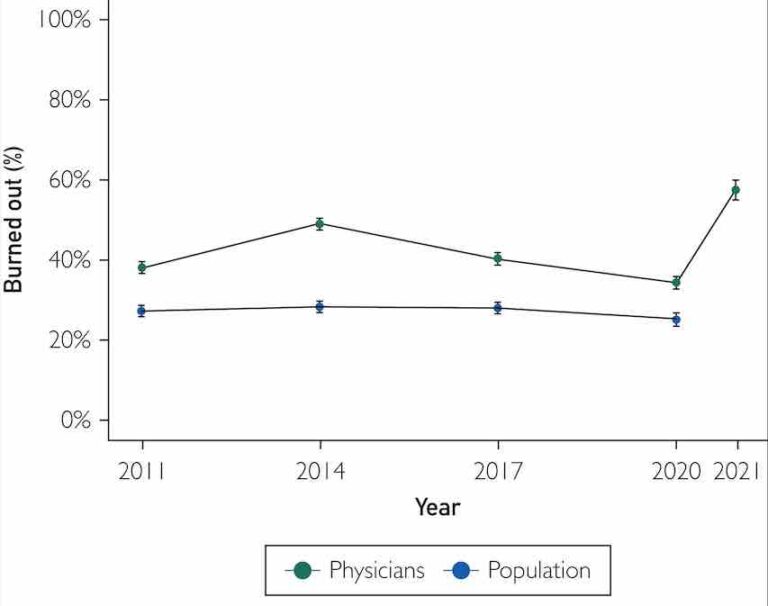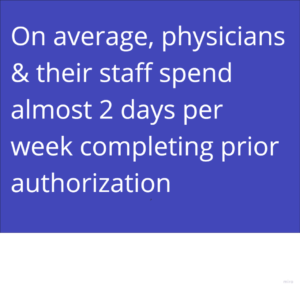What is “physician burnout” and how is it affecting you?
What is “physician burnout” and how is it affecting you?

American Medical Association has been closely tracking the physician burnout problem and the numbers are staggering. As of 2022, over 53% of the physicians had reported that major challenges with burnout. While there was a peak in 2021 with a reported burnout rate of 63%, it could be attributed to the challenges due to the pandemic peaking that year. Even if you discount that year’s numbers there has been a steady increase in the burnout rates over the years before that, as indicated in the research by Mayo Clinic.

Source: https://www.mayoclinicproceedings.org/article/S0025-6196(22)00515-8/fulltext
Now let us take a minute to comprehend why this is not just a concern for physicians but for all of us. The profession of medical doctor has been regarded as a noble profession for centuries. Doctors occupied superior status in societies across civilizations historically and that continues to be the case even today. However, in the last decade or 2, the healthcare environment in the US has drastically increased the pressure and workload on physicians and that is reflected in the chart above which shows that the physicians have almost 50% more burnout rate than the average population. Many of us might have experienced small periods of burnout at work or in personal life and can relate to the impact that it has on the psyche, and how it manifests in various aspects of daily activities. Just imagine the effect it has on physicians who really want to focus primarily on caring for their patients. According to AMA, physicians and staff spend 2 days per week on just prior authorization, when that process should be simplified, and that time could instead be spent with their patients.

The negative effect of this problem is self-evident. Each one of us might (or will) want more time with the physicians so that our questions are answered, concerns are discussed, and we all come out more satisfied with our physician interaction. It is unfortunate that the Herculean load carried by the physicians prevents them from spending that valuable extra time with their patients. The situation will continue to get worse if the problem is not addressed.
Upcoming legislation from CMS that mandates real-time or close to real-time prior authorization could be a great blessing or a great curse based on how technology can address the situation. If proper technology is in place both on the provider and the payer side, the automated completion or negotiation of prior authorization will significantly reduce the burden on providers. They no longer need to worry that critical care, that is potentially time sensitive, is not delayed for their patients. On the other hand, if proper technology is not in place, the need to quickly complete the prior authorization process manually will place an even greater burden on providers. There is a short window that is currently available where providers and hospital systems can get ahead of these upcoming legislations and use this to their advantage so that cost effective solutions for prior authorization will greatly reduce the manual effort and save on the total cost because most of the process will be automated and thereby greatly less expensive to implement and maintain.
Traditional technologies have been trying to solve the prior authorization puzzle using standard programming practices but due to the complex nature of the guidelines governing prior authorization they are not easy to implement. Recent advances in AL/ML and Gen AI offer new avenues to solve this problem much more effectively and can be a way forward to provide a smooth solution.
Using these technologies and already available tools such as FHIR, prior authorization can take information about the patient, the insurance and billing codes and suggest what is needed for the prior authorization. This could include patient records which can also be scanned using document handling libraries. This is like a co-pilot helping the provider navigate the completion of the prior authorization process.
We founded CloudAstra with the intent of addressing some of the pressing challenges that the healthcare industry is facing. One of the first problems we are tackling with is prior authorization (PA) and our approach is to use latest technologies like AI/ML and gen AI to make PA process as frictionless as possible and significantly reduce the amount of time that physicians and staff need to spend on that process. We have taken a stance to not sell this data to pharma companies, however we are ready to work with them to see how they can leverage technology (and not direct patient data) to improve their offerings.
If you are interested in finding out more, please contact us – sales@cloudastra.in
Contact Us
Let us innovate together. If you are interested in exploring this further contact us at https://cloudastra.ai/contact-us


